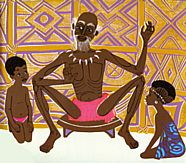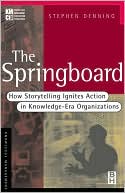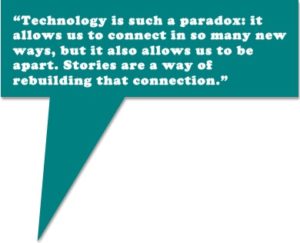
I am so excited to bring you a Q&A from Sean Buvala, a frequent commenter to A Storied Career. A storytelling “purist,” Sean keeps me on my toes, makes me think, and keeps me from descending too far into appreciating the sillier interpretations of storytelling and uses of applied storytelling. He is extremely active in many corners of the storytelling world and is a prolific Twitterer. His Storyteller.net is about the same age as Quintessential Careers, the parent site of A Storied Career, and his description later in this Q&A of the pioneering aspect of his site sounds much like the journey of QuintCareers. This Q&A will appear over the next five days.
Bio: (From one of Sean’s Web sites): Sean describes the collection of stories in his head as “life and legend” representing the mix of stories from his experiences, myth and legend from many cultures, sacred stories and observations of shared life events. As a storyteller, Sean primarily works with teens and adults in business and corporate settings. However, schools and libraries use him all the time for younger children. He describes his style as somewhere between “in your life and in your face” depending on the needs of the group he’s telling to/with at any given gathering.
Sean has been presenting and storytelling “on the road” since 1985. He’s traveled to perform and present workshops in dozens of states and to hundreds of organizations in those states. His audiences have ranged from just a few people gathered in a living room to several thousand teens and adults. He is the founder of Storyteller.net , the largest online resource for storytelling and storytellers.
, the largest online resource for storytelling and storytellers.
Sean’s experience also involves training and design for the telecommunication and hospitality industry. He’s done customer service instruction/team development for companies ranging from government to faith based organizations to major corporations. He’s taught and told for companies such as Wells Fargo, AT&T, Unilever, the Arizona Courts and more.
Most important of all, Sean is the father of four daughters and husband of one wife. He lives in the Phoenix, Arizona, area. His wife says that when he is home from the road, he is a great cook.
His current projects include Storyteller.net and “Outside In Storytelling.”.
Q&A with Sean Buvala, Question 1:
Q: The storytelling movement seems to be growing explosively. Why now?’ What is it about this moment in human history and culture that makes storytelling so resonant with so many people right now?
A: Storytelling has been bedrock to all cultures through history. In that, I mean the process of telling a narrative with a beginning, middle, and end to convey a particular thought, a societal idea or to entertain. With the advent of so many electronic communications, people are just growing more aware of their need for deeper communication and connectedness. Our neighbors are no longer the people who live next door. Now, neighbors are the communities and people we self select. Since so many people are now engaged in long distance communities, families and friends spread out, people are feeling a lack of something in their day-to-day existence. That longing is being met in sharing of story in its many forms.
There are many folktales that talk about wholeness or one person separated into two beings. It is only by coming to terms with one’s story and wrestling with oneself that these two parts can be made whole. Our stories are native and entwined in each of us.
For me, I do not think that I see the question as you see it. I am not so sure “storytelling” is growing explosively. I know that the use of the word “storytelling” is growing at a rapid clip, and it is being applied to all forms of communication. Therefore, now, everyone who shares any idea at all is a “storyteller.” I think this does a disservice to other art forms. For me, storytelling is the “mother” of all other communications. A person who excels at writing a story is an author, not a storyteller. A person who creates great videos is not a “digital storyteller” but rather a gifted filmmaker. There has been a dilution of the word storytelling. If everything we do is storytelling, then nothing is storytelling. I am neither a gifted author nor a filmmaker and do not wish to be. I am a storyteller and my work needs the presence of an audience right in front of me. Without an audience and immediate interaction, then whatever the artist is doing is not storytelling. It may be any of many other gifted and needed art forms.
 I am critiqued for expressing my understanding of what is and is not story. Essentially, I am accused of keeping people “out of the tent.” That is not my intention at all. “Story” has many ways to be expressed and there are tents all over the field. In my tent, story is presented in an oral expression (or ASL manual communication) called storytelling that requires a live audience of at least one person. Over there, there’s another tent filled with talented filmmakers expressing story. In a third tent, maybe there are talented dancers, scrapbookers, or authors. I do not want to dilute any of the art forms by having to cram us all into the same metaphorical tent. I want the freedom to go enjoy the filmmakers in their tent and maybe even join them in a few attempts of my own. I also know that all the artists in those other tents will benefit by coming and learning foundational things in the storytelling tent.
I am critiqued for expressing my understanding of what is and is not story. Essentially, I am accused of keeping people “out of the tent.” That is not my intention at all. “Story” has many ways to be expressed and there are tents all over the field. In my tent, story is presented in an oral expression (or ASL manual communication) called storytelling that requires a live audience of at least one person. Over there, there’s another tent filled with talented filmmakers expressing story. In a third tent, maybe there are talented dancers, scrapbookers, or authors. I do not want to dilute any of the art forms by having to cram us all into the same metaphorical tent. I want the freedom to go enjoy the filmmakers in their tent and maybe even join them in a few attempts of my own. I also know that all the artists in those other tents will benefit by coming and learning foundational things in the storytelling tent.
I think I know that we in the storytelling communities have lost grip on the word “storytelling” and I am banging a drum that no one will really hear. Nevertheless, my place in life is to call the crowd to many different ways of thinking and says, “Look over here.” I would be untrue to my art and myself if I did anything less.






